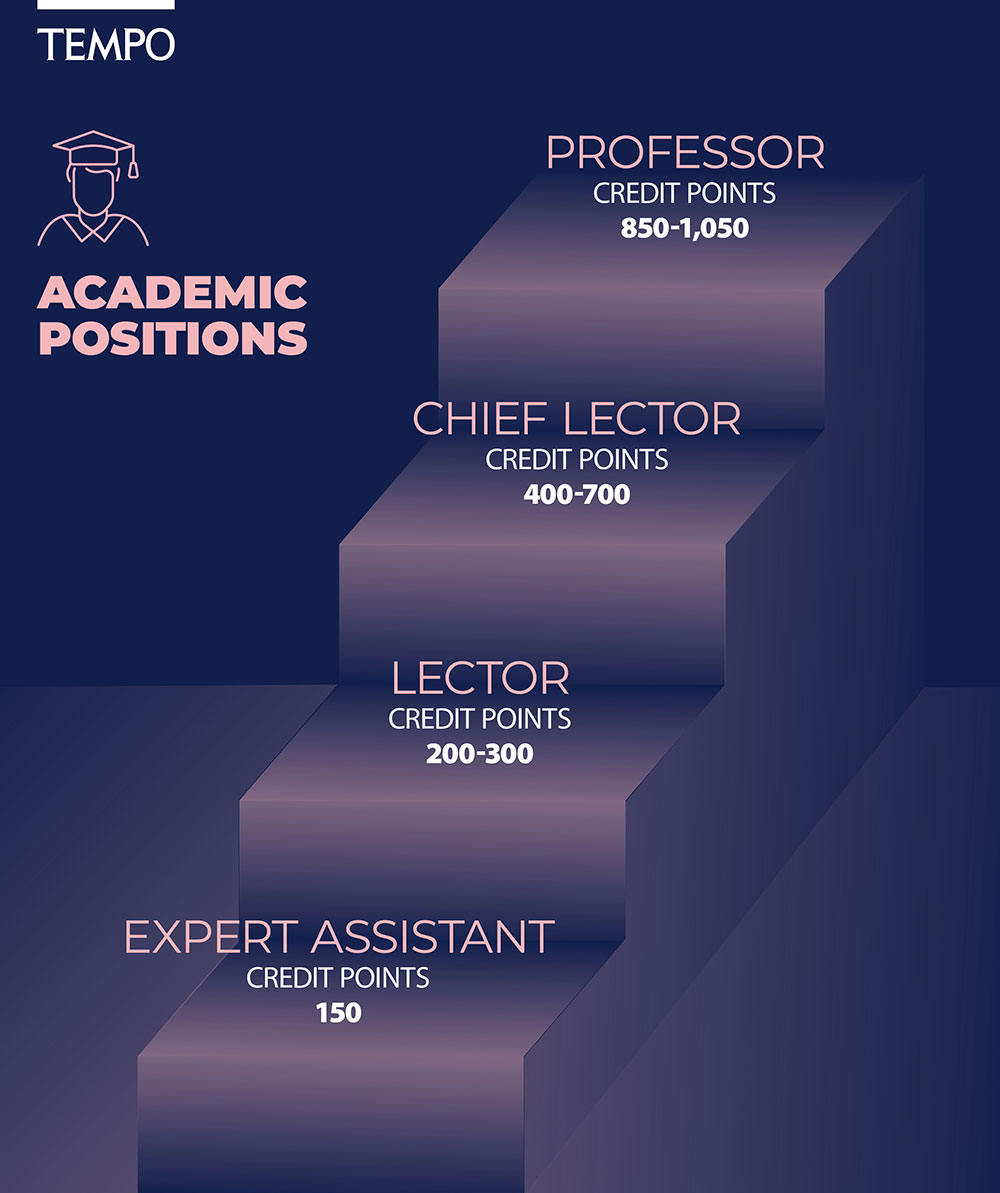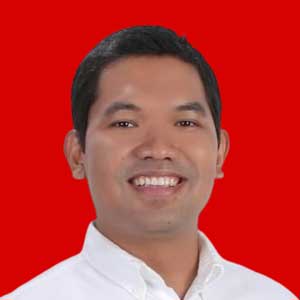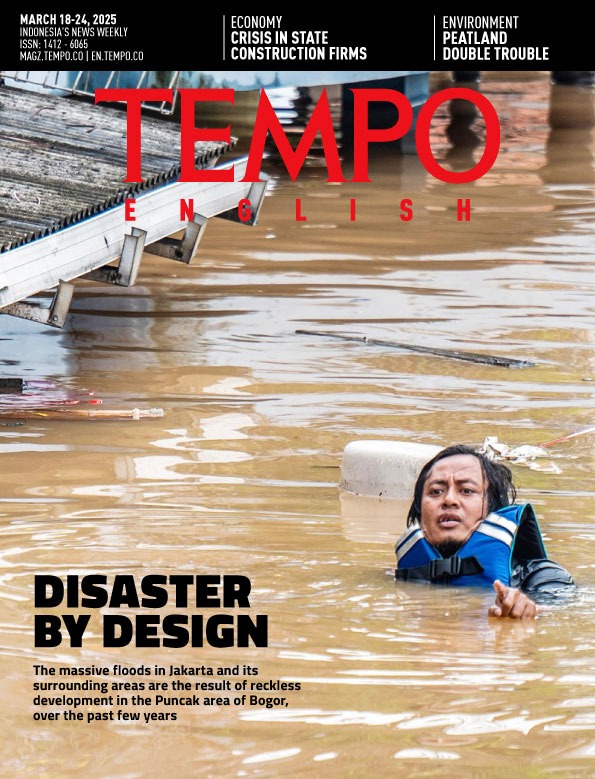Professorship Scandal Involving Predatory Journals and Team of Assessors
Monday, July 8, 2024
The professorship of various public figures and officials appear to be problematic. Their titles were earned thanks to certain assessors and predatory journals.
arsip tempo : 174390338159.

GOLKAR Party politician Bambang Soesatyo has had the ambition to become a professor since 2019, four years before he received his doctorate from the Padjadjaran University in 2023.
He claimed he was not after the financial benefits that come with the academic title. “The status would make my family and friends proud,” he told Tempo in Kebayoran Baru, South Jakarta, on Monday, June 17. To fulfill his ambition, the People’s Consultative Assembly (MPR) Speaker completed a series of tests to obtain a lecturer certification, one of the requirements to becoming a professor.
But academicians aware of Bambang’s professorship candidacy revealed irregularities, including issues related to his educational background and teaching experience. In mid-June, the Ministry of Education, Culture, Research, and Technology’s database recorded that Bambang had completed his master’s degree even before he obtained his bachelor’s degree.
Bambang received a master’s degree in business administration from the Newport Indonesia Management Institute (IMNI) in 1991. One year later, Bambang graduated with a bachelor’s degree from the school of economics, STIE Jakarta. The Ministry’s database also notes that Bambang has had less than five years’ teaching experience although a professor must first work as a lecturer for 10 years. The database website no longer displayed Bambang’s graduation year when it was accessed on July 3.
Bambang claimed that he attended IMNI and STIE at the same time. According to him, final exams and graduation took place simultaneously at both campuses. “But the master’s degree certificate from IMNI was issued before the bachelor’s degree,” said the member of the House of Representatives’ (DPR) legal affairs commission.
Professorial titles have become coveted by DPR politicians. Bambang’s colleague at the DPR, Sufmi Dasco Ahmad, for example, received the title of law professor from the Pakuan University in Bogor, West Java, on December 1, 2022. In his scientific oration, Dasco discussed the topic of the people’s sovereignty in general elections. Prabowo Subianto attended the inauguration event at the Sentul International Convention Center, Bogor Regency.

Defense Minister Prabowo Subianto (right) congratulates Sufmi Dasco Ahmad after being inaugurated as a professor at Pakuan University, at the Sentul International Convention Center, Sentul, Bogor, West Java, December 1, 2022. kemhan.go.id
Dasco said he obtained the title of professor through great effort. The Deputy Speaker of the DPR asserted that, given his current position, he could have easily received an honorary professor title. “I teach, research, and serve,” Dasco said in a written interview by Tempo on Friday, May 31.
Tempo’s investigation found indications of irregularity in Dasco’s academic title. The professorship application document with the Education Ministry notes that the Gerindra Party Executive Chair has been a lecturer since September 2010. The information on Dasco’s teaching history differs from the information listed on the Higher Education Database accessed in the first week of June 2024.
According to the website, Dasco only began teaching at the Azzahra University in 2016, and only for four semesters. Dasco stopped teaching there in the second semester of 2017. Around the same time, the Ministry of Research, Technology, and Higher Education imposed an administrative sanction on the campus located in Jatinegara, East Jakarta.

Deputy Speaker of the House of Representatives, Sufmi Dasco Ahmad, during his scientific speech titled Democratic and Dignified Elections within the Framework of the Spirit of People’s Sovereignty, at the Sentul International Convention Center, Sentul, Bogor, West Java, December 1, 2022. dpr.go.id
A member of the Education Ministry’s Academic Performance Evaluation Team familiar with the review process explained that Azzahra University was sanctioned for various violations, primarily concerning lecture management. The sanction was lifted in April 2018.
After Azzahra University, Dasco taught at Pakuan University. According to the Higher Education Database, Dasco only began teaching there in 2020 and took one year off from teaching in 2021. He resumed teaching in 2022, teaching history of law and constitutional law.
This timeline indicates that Dasco had not yet completed five years as a lecturer when he was confirmed as a professor. However, as of July 4, the new format of the Higher Education Database displays different information, stating that Dasco has been teaching from the fall semester of 2010 until the second semester of 2024.
Dasco claimed his teaching career began in 2010 at Kebangsaan Republik Indonesia University. He is now the rector of this Bandung-based university. “There’s a possibility that Azzahra University did not update my teaching history data,” he said.
•••
THE irregularity of professorship titles among public figures was uncovered during the Ministry of Education, Culture, Research, and Technology’s investigation into the confirmation of 11 professors at Lambung Mangkurat University (ULM), Banjarmasin, South Kalimantan. The Ministry opened the investigation after a whistleblower filed a report on the legitimacy of the titles held by lecturers at ULM.
Lukman, Director of Human Resources at the Directorate-General of Higher Education, confirmed the investigation into the professorship titles. “We received a complaint,” said Lukman in Senayan, Jakarta, on Monday, May 27.
Three sources familiar with the investigation stated that the requirements for the professorship applications of the public figures were also problematic. All three believe that the root of the issue is the requirement to have an article published in a reputable international journal.
Tempo investigated the scientific articles submitted by officials and public figures, including the DPR Deputy Speaker, Sufmi Dasco Ahmad. According to the academic assessment sheet, Dasco was a lecturer when he was proposed for a professorship. In the regular track, a lecturer must first be promoted to senior lecturer before becoming a professor. Thus, Dasco skipped the promotion from lecturer to professor.
The 2019 Operational Guidelines for Credit Score Assessment by the Education Ministry allow such a leap in rank. However, the lecturer must write four articles in reputable international journals.
Dasco submitted eight articles. Five of them were labeled green and deemed eligible for promotion. Another article, titled Cybercrime in the Context of Criminal Defamation in Indonesia, was labeled red because it was published in the now-discontinued journal Webology.
At first glance, Dasco met the requirement for a jump in rank to professor by having five out of the four required articles. However, upon examining the five articles, Tempo found irregularities.
In 2021, the Gerindra Party politician wrote an article titled Criminal Law and Criminal Psychology: Integration of Corruption Prevention in Indonesia. This article was published in the Journal of Positive Psychology and Wellbeing. The journal’s website listed its publishers as being located in Selangor, Malaysia, and Adana, Turkey.
According to Tempo’s investigation, the Scopus database indicates that the Journal of Positive Psychology and Wellbeing was discontinued in 2020, two years before Dasco received his professorship title. The Web of Science database does not list this journal at all. The Education Ministry stipulates that reputable international journals must be listed in international databases such as Scopus and Web of Science.
Another article titled The Guarantee of Independence of Judicial Power Post-Amendment Undang-Constitution 1945 was published in the Journal of Positive School Psychology. Interestingly, the office address, website address, and front page layout of this journal are identical to those of the Journal of Positive Psychology and Wellbeing.
The difference is, the Journal of Positive School Psychology is not found in Scopus, Web of Science, or the Scimago Journal Rank—a journal ranking index developed by Universidad de Granada in Spain.
Two academicians familiar with Dasco’s candidacy stated that the two psychology-themed journals are not suitable for fulfilling the requirements for a professorship. The reason is that the journal themes do not align with the field of law that Dasco specializes in. In response to Tempo, Dasco claimed that legal studies fall under the social sciences category, which is accommodated by these journals. “The journal was still indexed in Scopus in 2022,” he said, attaching a screenshot of the journal’s website with a Scopus label.
Tempo visited the site and clicked on the Scopus label shown by Dasco. Voila! The Scopus site displayed the label “Source Not Found.”
Two other articles by Dasco, claimed to be published in the journals Ayer and Linguistica Antverpiensia, also appeared problematic. On the assessment sheet, Dasco attached an article published in 2020 in Ayer Volume 27 No. 4. However, the official Ayer website only lists four issues published in 2020, namely Volumes 117, 118, 119, and 120. There is no Volume 27 No. 4 as claimed by Dasco.
Dasco’s article, claimed to be published in Ayer, is titled Legal Sanctions Against Contempt of Court Actors: Analysis Based on Criminal Law and Criminal Procedure Code. Dasco wrote this article in English, whereas all articles on Ayer’s official website are written in Spanish.
The document claimed to be the proof of correspondence between Dasco and Ayer’s publisher reveals another oddity. Dasco sent a photo of this correspondence to Tempo. However, Tempo’s investigation obtained copies of the letters exchanged between Dasco and Ayer’s Managing Editor. The correspondence included a link to Ayer’s website, but upon clicking, it redirected to the International Journal of Innovation, Creativity, and Change, not to Ayer.
Likewise, an article published in the journal Linguistica Antverpiensia titled Indonesian Maritime Border Dispute Resolution: Overview from an International Legal Perspective is claimed to be in Volume 2, 2021. However, the official website of the journal, managed by the Department of Applied Linguistics at the University of Antwerp, Belgium, shows only one edition published in 2021, which is Volume 20.
Responding to these irregularities, Dasco insisted that his articles were indeed published in Ayer and Linguistica Antverpiensia, both indexed in Scopus and classified as reputable journals. He mentioned that these journals are used by many Indonesian authors. However, Dasco said there was an error with the links to his articles. “The journals’ malfunctioning links are out of (my) control because the systems are managed by the publishers,” he said.
Similar to Dasco’s articles, an article written by Muhammad Afif Hasbullah, Chair of the Business Competition Supervisory Commission (KPPU) from 2018 to 2023, also raised suspicions. Afif was confirmed as a professor of law at Darul Ulum Islamic University, Lamongan, East Java, in October 2023.

Chair of the Business Competition Supervisory Commission (KPPU) for 2018-2023, Muhammad Afif Hasbullah, during his inauguration as a professor of law at Darul Ulum Islamic University, Lamongan, East Java, October 2023 kppu.go.id
Afif wrote an article in the Journal of Positive School Psychology, the same journal used by Dasco, which is not found in any international database. This was not the only irregularity in Afif’s journal requirements. He wrote an article titled Legal Policies for Handling the Covid-19 Pandemic in the Perspective of Emergency Law and Human Rights, claimed to be published in the journal Italienisch Volume 12, No. 2, 2022.
Published in Germany since 1979, the full name of the journal is Zeitschrift Italienisch, dedicated to reviewing Italian language and literature. This topic clearly differs from the field of law that Afif specializes in. Afif’s article was not found in Italienisch’s official archives. The database shows the journal published twice in 2022, Volume 44, No. 87 and 88.
Similarly, Afif’s article claimed to be published in Dialogos is also questionable. On the assessment sheet, Afif claimed to have written an article on economic recovery due to Covid-19 in Dialogos Volume 26, No. 1, 2022. Although there is an edition corresponding to Afif’s claim in this Portuguese-language journal, Afif’s article was nowhere to be found.
Afif insists he wrote articles for Italienisch and Dialogos. He denies accusations of falsifying reputable international journal requirements to attain the professor title displayed next to his name on the official KPPU website. “I genuinely submitted articles to those journals,” he stated in a phone confirmation on May 29.
Four other articles by Afif were published in the International Journal of Cyber Criminology (IJCC) and the International Journal of Criminal Justice Science (IJCJS). These journals are considered predatory and were used by 11 lecturers from Lambung Mangkurat University to obtain professorships. The Ministry of Education, Culture, Research, and Technology is investigating academic violations related to these journals. “There are attempts to manipulate articles,” said Lukman, Director of Human Resources at the Directorate-General of Higher Education, Ministry of Education.
These journals are labeled as predatory because they charge authors a fee to publish their articles. The official websites of these journals openly demand 2,000 pounds sterling—approximately Rp41.5 million—for publishing a single article. Interestingly, the editors of IJCC and IJCJS charge additional fees of 500 pounds sterling for Indonesian authors for editing into proper academic language.
Afif stated that he submitted his work to IJCC and IJCJS based on recommendations from colleagues. “I browsed and found that these journals were indexed in Scopus, so I sent my articles there.” He also admitted to paying fees to have his articles published. “Everything was charged a fee by the publisher.”
Idhamsyah Eka Putra, a member of the Advisory Board of the Indonesian Caucus for Academic Freedom (KIKA), noted that predatory journals are popular because they make it easy to publish articles. Authors do not undergo a stringent peer-review process.
According to Idhamsyah, publishers of predatory journals lure authors with the promise of being indexed in Scopus, a key metric for academic credit assessment in Indonesia. A Ph.D. graduate from Johannes Kepler University in Austria, Idhamsyah noted that one percent of journals indexed in Scopus are suspected of being predatory. With approximately 40,000 journals in Scopus, this means at least 400 journals are problematic. “Many articles by Indonesians are found in that one percent,” he said.
Predatory journals like IJCC and IJCJS are often used by Indonesian officials and public figures. Among them are Deputy Attorney General for Intelligence Reda Manthovani and Siti Nur Azizah, a lecturer at 17 Agustus 1945 University in Jakarta. Azizah, 51, is the fourth child of Vice President Ma’ruf Amin.
In the assessment documents reviewed by Tempo, Reda applied for a promotion from lecturer to full professor. Four articles were approved as requirements for professorship, all published in IJCC and IJCJS in 2023. The evaluation team marked two articles green and two yellow. A yellow label signifies that an article requires revision.
Reda claimed his professorship in law from Pancasila University was obtained through a lengthy process. He has been teaching there since 2011 and stated that his promotion underwent verification at the university, by the evaluation team, and at the Education Ministry.

Reda Manthovani during his inauguration as a professor at Pancasila University, at the Pancasila University Multipurpose Building, Jakarta, January 25, 2023. univpancasila.ac.id
Reda asserted that his articles in IJCC and IJCJS were published following proper procedures, including correspondence with the publisher and there was no objection from the Education Ministry. He mentioned that many candidates for professorship and lecturers publish in these journals. “I did not know whether the journals were under investigation as predatory or not,” he said.
Similarly, Azizah was given a double promotion from lecturer to professor due to articles in IJCC and IJCJS. On March 19, 2023, Tempo reported the controversy surrounding the awarding of a professorship to Azizah by Surabaya State University (Unesa). Unesa lecturers protested the awarding of the title due to several irregularities, including Azizah’s teaching history and the quality of her scientific articles in IJCC and IJCJS.

Siti Nur Azizah, daughter of Vice President Ma’ruf Amin, during her inauguration as a professor at Surabaya State University, Surabaya, East Java, March 16, 2023. wapresri.go.id
Azizah denied any issues with using IJCC and IJCJS. “I met the academic and administrative requirements,” she said. Regarding publication fees, she acknowledged paying them but could not recall the amounts. “Each journal is different,” said the doctoral graduate of Krisnadwipayana University, Jakarta.
•••
THE investigation into the professorship scandal at Lambung Mangkurat University in Banjarmasin reveals more than just the use of predatory journals. Three academics familiar with the probe by the Education Ministry, said that the investigation has uncovered a network of assessors—known as reviewers or evaluators—who manipulate and dominate the professorship evaluation process within the Ministry.
The assessor team has the authority to evaluate the compliance of articles published in international journals and the adequacy of academic credits, and looking into potential academic violations. This means they play a crucial role in determining whether a lecturer is worthy of becoming a professor. According to Education Ministry data, at least 312 professors are part of this evaluation team.

Two lecturers within the Education Ministry explained that internal investigators have scrutinized the existence of this assessor network. They held several meetings throughout April and May to assess the competence of the assessors and examine the distribution of evaluation tasks.
Meeting minutes reviewed by Tempo contain recommendations for the Directorate of Human Resources at the Directorate-General of Higher Education to develop a system for transparently distributing assessor tasks. The same document states that only 142 professors are deemed competent to be part of the evaluation team. However, the most crucial record is that 15 assessors have been removed from the evaluation team list.

Lukman, Director of Human Resources at the Directorate-General of Higher Education, confirmed that there were indeed several problematic assessors. They have already been examined by the internal team of the Education Ministry. “We have imposed sanctions,” he said.
Tempo obtained a shortlist of assessors sanctioned by the Education Ministry from a source well-versed in evaluating professorships. This source claimed that the disqualified evaluators had formed a network and tended to pass problematic candidates. When asked to confirm the names of these assessors, Lukman declined to disclose them.

The list of removed assessors included Mokhamad Khoirul Huda from the Faculty of Law at Hang Tuah University, Surabaya, and Ida Nurlinda, a professor from Padjadjaran University. Tempo has examined the matrix of professorship applications and evaluation documents approved in 2023 to establish their connection.
Huda and Ida were part of the team assessing professorship candidates at Lambung Mangkurat University (ULM), which has recently come under scrutiny. Professors from ULM have been accused of using predatory journals and manipulating correspondence with journal publishers. Huda evaluated eight professorship candidates at ULM, while Ida assessed three. They also collaborated as the first and second assessors for five ULM lecturers.

Huda and Ida’s partnership extends beyond ULM. They jointly assessed professorship candidates at Langlangbuana University in Bandung, Tadulako University in Palu, and Yogyakarta State University. They allegedly approved candidates who did not meet the necessary criteria.
Huda, for instance, evaluated Muhammad Afif Hasbullah, the former KPPU Chair. Afif twice submitted the requirements for becoming a professor. On December 12, 2022, he attached only one article published in a reputable international journal. He then revised his documents on April 27, 2023, adding seven more articles claimed to be published in reputable international journals.

Tempo’s investigation revealed that Huda approved Afif’s professorship even after marking all the articles with a red label. Huda admitted that he initially rejected Afif’s submission but said Afif was approved after revising his documents. “He reapplied and eventually met the requirements,” said Huda on Tuesday, June 4.
Regarding the allegation of working together with Ida in evaluating various professorship candidates, Huda denied any wrongdoing. He claimed not to know the identity of his assessor partners. “It’s part of independence and confidentiality principles,” he said.

Like Huda, Ida also approved questionable professorship candidates. One such candidate is Ibnu Sina Chandranegara, a lecturer at Muhammadiyah University, Jakarta. He was appointed as a professor of law at the age of 33, making him the youngest law professor in Indonesia. A poster of Ibnu as a speaker at an online seminar on strategies for becoming a professor for novice lecturers has circulated on social media.
But there are irregularities in Ibnu’s application for professorship. His four articles in reputable international journals are suspected to be problematic. Some were published in permanently discontinued journals, non-reputable journals, and in journals related to economics, which are irrelevant to legal studies.

When contacted for confirmation on Tuesday, June 4, Ibnu denied any issues with his article requirements. According to him, there is a specific classification for journals in the fields of economics and law. Ibnu claimed that his articles were published in journals relevant to his expertise. “My expertise is in law and economics,” he stated. Regarding the discontinued journal, Ibnu mentioned that the journal was still indexed in Scopus when he submitted his professorship application.
Ida Nurlinda declined an interview when contacted in early June. “I’m unavailable.” Padjadjaran University spokesperson, Dandi Supriadi, said Ida has already explained the Education Ministry’s investigation into assessors. “Ida explained to the team from the Inspectorate-General of the Ministry that there were no procedural violations during the assessment,” said Dandi.

In addition to Huda and Ida, another disqualified assessor is Indah Susilowati from Diponegoro University, Semarang. Two academics and a former senior official of the Education Ministry said that Indah played a significant role in placing professorship assessors. She was the coordinator for assessing candidates in the social sciences field.
According to the same sources, Indah had considerable influence over assessors due to her close relationship with former Director of Human Resources at the Education Ministry’s Directorate-General of Higher Education, Mohammad Sofwan Effendi, who now teaches at Jakarta State University. Sofwan was replaced amidst an internal investigation by the Education Ministry regarding professorial titles. The Director of Human Resources is the official authorized to approve assessor assignments.

Documents reviewed by Tempo regarding academic position assessments recorded Sofwan’s relationship with Indah. In 2023, while still serving in the Ministry of Education, Sofwan applied for an academic promotion from lecturer to senior lecturer. Indah was the assessor who evaluated Sofwan.
In the assessment records, Indah approved one of Sofwan’s articles in the Journal of Business and Management Education published by Malang State University, East Java. Indah approved Sofwan’s promotion to lector effective July 1, 2023.
Tempo went to the Jakarta State University to ask for Sofwan's response, but he could not be found. Contacted via WhatsApp on June 12, Sofwan denied having authority over assessors. “The assessment team is assigned by the Director-General of Higher Education,” he stated. At that time, the acting Director-General of Higher Education was Nizam.
In a written interview on June 27, Nizam claimed to have directed the Director of Human Resources to maintain the integrity of assessors. He proposed that 20 to 30 percent of the assessment team members be rotated periodically. “If there are indications of malpractice, we report them to the inspectorate,” said Nizam, a lecturer at Gadjah Mada University, Yogyakarta.

Indah Susilowati, lecturer at the Faculty of Economics of Diponegoro University in Semarang, at Binus campus, Jakarta, 2014. binus.ac.id
Indah was also the assessor who evaluated and approved the promotion of Gerindra Party Executive Chair, Sufmi Dasco Ahmad, from lecturer to professor. Four academics familiar with the professorship assessment criteria disclosed that Indah, whose background is in economics, was an odd choice. This is because Dasco aimed to become a professor of law.
Dasco claimed to not knowing or meeting Indah. According to him, candidates for professorship are prohibited from meeting with assessors during the assessment process. “The assessment team is selected by the Directorate-General of Higher Education,” said Dasco.
However, some assessors do hold meetings with professorship candidates. Ida and Indah are among them. Ibnu Sina Chandranegara, a lecturer at Muhammadiyah University Jakarta, admitted to meeting with Ida in a clarification forum for lecturers whose professorship applications were rejected. Evaluation sheets reviewed by Tempo also indicated that Ida and Indah held meetings with assessed professors.
This is where the problem lies. Two academics from universities in Yogyakarta revealed that these meetings provided a loophole for assessors to negotiate with problematic candidates. They mentioned the term “providing incense for the assessment team,” implying a bribe-like gesture to ensure passage through the professorship evaluation.
Director of Human Resources at the Education Ministry, Lukman, stated that his institution needs time to prove any financial transactions between candidates and assessors. “If indeed there are such transactions, we will handle them all,” he assured.
Tempo attempted to meet Indah by visiting her office and home address in Jalan Peres, Semarang. The address led to a location of a gas cylinder distributor. On the gate of the house there was a signboard with the text “3 Kg LPG Agent - PT Sapta Putra Utama.” Local residents confirmed that this gas depot belongs to Indah, who currently resides in Tembalang area, near Diponegoro University campus.
Indah responded to messages sent to her phone number. She stated that she had already provided clarification to the Education Ministry’s team. Indah refused to elaborate further, citing ongoing improvements within the Directorate-General of Higher Education. “God willing, I did not do what is alleged,” she said.
What is certain is that Education Minister Nadiem Makarim is aware of this professorship scandal. Three sources familiar with the internal investigation revealed that one of Nadiem’s special staff members was involved in various meetings discussing the professorship investigation at Lambung Mangkurat University. Nadiem has also received a written report regarding the assessor conspiracy.
Acting Secretary of the Directorate-General of Higher Education, Tjitjik Sri Tjahjandarie, confirmed that Nadiem is closely monitoring the professorship case. “The results of the inspectorate-general’s investigation must be followed up according to recommendations,” stated the professor from Airlangga University, Surabaya.











